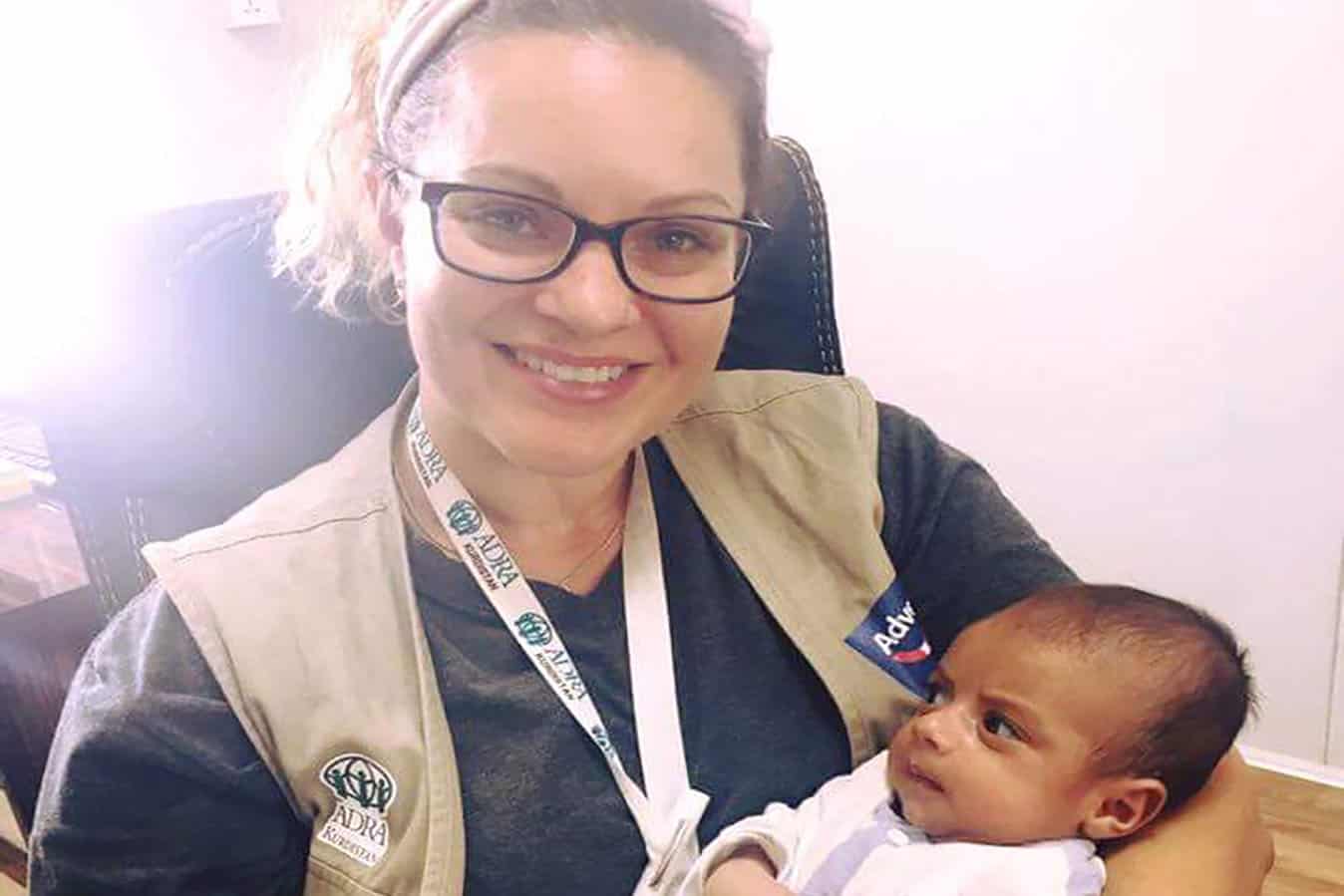In recognition of World Humanitarian Day, we pays tribute to all humanitarian nurses and midwives. The ANMJ has featured many of these extraordinary nurses and midwives, highlighting the exceptional care they have given- including emergency nurse and paramedic Helen Zahos.
“I am an ordinary person who has had some extraordinary experiences,” says humanitarian, emergency nurse and paramedic Helen Zahos. In 17 years of nursing, Helen has nursed post events such as the Bali Bombing, floods, cyclones, and typhoons. She has joined numerous international responses from the Philippines and Nepal to Syria and Iraq.
Helen grew up on Groote Eylandt in the Gulf of Carpentaria. “Going back to a little girl, I was always bandaging stuff up and I was a girl guide. So I knew from a young age I would be helping people in some way – I just didn’t know it would be in nursing and as a paramedic.”
Helen says she has always faced challenges head on, including getting a pet children’s python called Demetri because she was petrified of snakes. “I thought: ‘How can I get over this? Perhaps by watching how they behave.’”
Similarly, she took up scuba diving to tackle a fear of crocodiles and sharks instilled from living on Groote Eylandt. “I thought maybe if I can just see what’s happening under the water.”
Fear holds people back and gets them stuck, Helen says. “You need to go out and give it a go or you’ll never know.”
As a student nurse, Helen took on a first aid course and ended up doing studies in paramedicine on the weekend. “It was another side to emergency healthcare and it was hands on.” It was this that landed her the first graduate position in the ED at Royal Darwin Hospital. “I was in the elevator as a paramedic with a patient, with the coordinator for student nurses. On my way up she said to me ‘you are one of our students. You can obviously handle blood and guts and cope with stressful situations’. It was literally an elevator ride that got me on my way. My whole career I have been absolutely lucky at the time.”
Helen worked remote area nursing, including a stint in the APY Lands were Gayle Woodward was murdered. She herself was attacked in an incident with an axe.
“I took time off I was pretty traumatised. I felt disappointed that I didn’t jump up and down a bit more for change. But at the time I was too traumatised. It shouldn’t have come to the point where a nurse gets murdered to address nurse safety.”
It’s Helen’s humanitarian and nursing work which has left indelible marks on her professionally and personally. She volunteered in Northern Greece, in a Syrian refugee camp last year. “Three months was very intensive with mass casualties. In Lesbos, I was there for a couple of weeks – there were 5,000 people a day. It was so hectic that UNHCR couldn’t count them all.”
A tragic boat tragedy ensued while Helen was there, in which 11 people died.
“I speak Greek and so I was with mums identifying their babies who had drowned in the morgue. It was so big yet the world didn’t hear about it. We were crying out ‘this is happening now. We do not have the resources.’
“The difference between a cyclone or a typhoon is the whole world turns up to help. When there is a crisis due to war or conflict no one wants to be involved.”
Helen says such was the desperation of people fleeing for their lives that even NATO warships sitting in the water did not deter people coming. “Those life jackets cost 700 euros. People had been out for weeks on end exposed to the elements. You see a lot of traumatised people in the camps.”
Helen worked on Christmas Island at the Asylum Seeker Detention Centre in 2013.
“I had the pleasure of meeting the most beautiful people – women and children.”
She describes the experience as deeply disturbing. “There were kids waiting at the fence, calling you ‘officer’. It was really hard to see the little ones drawing pictures for you. We would ask them to write their names on their pictures to put them up on the wall and they would write their boat numbers. These children were in our care – this is their welcome to Australia.”
Helen is often contacted by other nurses seeking similar experiences. “This did not happen overnight. But still I say ‘wow’ I’ve ticked all my boxes.
“I say to the girls who have got their skills up and are comfortable to travel, I highly recommend it, particularly the smaller hospitals around Australia where there is amazing teamwork where people really pull together and you are very much part of the community.”
Helen says nurses don’t have to volunteer overseas for months on end, they can take time out while on holiday.
“There are smaller groups that will take you on. It’s about putting it out there. Let people know, let organisations know that you want to help. Register online. If an event happens you are already processed, it’s too late when an event happens.”
Helen says she is passionate and proud to be a nurse. “Nursing is not just a career, it’s a way of life. It’s who you are.”
Her advice to others is to be the ‘best you can be’. “Challenge yourself. Take opportunities when you get them, do not let them go by. You may surprise yourself. Don’t be scared to ask for help and equally admit when you don’t know.”
While skills such as quick thinking and compassion are handy, Helen says at the end of the day it’s about the patients. “I’m not saying you have to be an activist, but you do have to be an advocate.”








